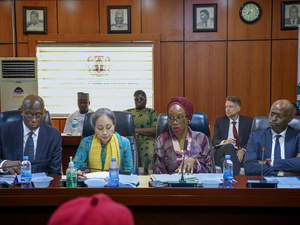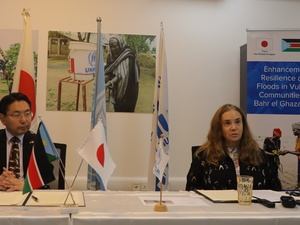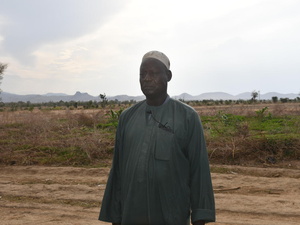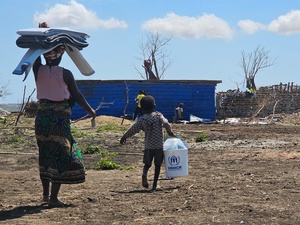Planting 2,000 trees in the Far North region of Cameroon to help combat desertification
Planting 2,000 trees in the Far North region of Cameroon to help combat desertification

Gori Moussa, an internally displaced woman in Cameroon, plants trees to combat desertification.
Gori Moussa, a single mother of six, fled conflicts in Logone et Chari (Northern Cameroon) last year. She comes from a farmers' family and has been interested in planting trees with her grandfather since she was a toddler. "It reminds me of happy family memories before conflicts tore them apart," she said. "Our grandfather always told us that planting trees revives the earth."
Other women, such as Hadidja, an IDP women's committee member, were also eager to reforest their cherished homeland and create a greener, more sustainable future through this powerful display of resilience and community engagement. Hadidja joined the committee to support the local community in keeping the area clean, raising awareness about protecting the environment, and reforestation. “When we arrived here, we were welcomed by the community. Unfortunately, our presence significantly impacted this environment through deforestation and waste in this small community. Together with other women, we sensitize people to live in a clean environment for the good of the community, our children, and ourselves.”
She says planting trees and caring for them is crucial to making Bogo green again. It is also a way of giving back to the community and repairing the environmental damage caused by displacements in the region. "The area was green upon our arrival. But because the displaced families were chopping firewood for cooking and selling it to make some money for their families, the place resembled a desert."
Environmental issues exacerbated by Climate change can be the cause of desertification, soil erosion, and floods. They have wreaked havoc on the Far North region of Cameroon, an area located on the southern edge of the Sahara Desert. The continuous influx of refugees and internally displaced persons (IDP) in the area has also engendered a loss of natural resources, worsening the situation.
Now, these displaced women are giving back to those communities where they have found safety
To further help restore the area's ecosystem and mitigate the impacts of climate change while improving the social inclusion of the affected populations, UNHCR has given its support to YCO4PSD and The World We Want in Maroua. These two local associations organized the planting of 2,000 trees selected from indigenous tree species resilient to the region's arid conditions in the Bogo site. The planting was launched on World Day to Combat Desertification and Drought, held annually on 17 June.
Given this year's theme, "Her Land. Her Right", the initiative focused on bringing women and girls to the forefront of land restoration and drought resilience efforts – as well as climate change adaptation –and so it was purposely done in collaboration with internally displaced women living on the site.
Education has also been an integral aspect of this initiative, with the internally displaced women and local associations actively engaging in environmental awareness campaigns; 200 women and girls also participated in different workshops and shared their knowledge with neighboring communities.
According to the Maroua Sub-Office, this initiative is a great example of the value of working hand in hand with host communities and affected populations and highlights the transformative power and vital role of collective action, gender empowerment, and local knowledge in tackling environmental challenges.
The Far North region has generously hosted forcibly displaced people for decades, including Nigerian refugees and internally displaced people, which unfortunately has played a role in its environmental degradation. But with this initiative, these remarkable women are creating a legacy of environmental stewardship, sustainable development, and a greener life for future generations. As the trees grow and thrive, the region will witness a resurgence of life and hope for women who help each other and youth care for the environment at the Bogo site through unwavering determination.
"This region has kept its heart open to people in need of protection, showing solidarity with newcomers in communities." says the Head of UNHCR Sub-Office in Maroua, Kimberly Roberson. "And now, these displaced women are giving back to those communities where they have found safety."









